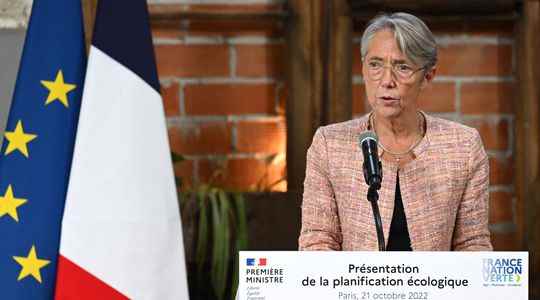Elisabeth Borne launched, this Friday, October 21, 22 projects relating to the ecological planning for which she is responsible to lead a “fairer” transition and make France a “green nation”.
“Let’s avoid fracturing. Let’s hear both those who are afraid that we are going too fast and those who are afraid that we are not doing enough. We must join forces. Go to the front together” and “combine radicality and progress”, affirmed the Prime Minister.
Accompanied by several ministers, including Agnès Pannier-Runacher (Energy Transition) and Christophe Béchu (Ecological Transition and Territorial Cohesion), Elisabeth Borne spoke at La Recyclerie, a space dedicated to eco-responsibility in the 18th arrondissement of Paris, upstream of a National Council for Refoundation on Climate and Biodiversity.
Without presenting new actions, concrete or symbolic, the head of government, a polytechnician by training, said “to assume” an ecology “of responsibility, where we refuse simplism and we say to the French (…) that the solutions are complex”, by identifying “levers” from “series of indicators”, which “may seem complex or abstract”. “There is unfortunately no miracle solution to the ecological transition and yet many continue to call for it and choose totems rather than structural changes. My conviction is that we must act, at the same time, and on all fronts”, she insisted, refuting the “races to the symbol”.
Accompany “the most modest and those who will be hit by the transitions”
She mentioned 22 projects, from the renovation of housing to the decarbonization of industries, which revolve around six themes of daily life: getting around, housing, eating, producing, consuming, preserving our ecosystems (the soils, forests, water, oceans), and will be deployed under the banner “France nation verte”.
She defended a “greener” France which is also “more just”, “a condition for the ecological transition to be accepted, effective and unifying”. President Emmanuel Macron had to abandon a carbon tax project after the outcry of the “yellow vests” movement in 2018.
“It is obviously not up to our compatriots in fuel poverty to make additional efforts,” she said. “Conversely, those who emit the most, and who have the most resources, must also be those who support our ecological transition the most”, by “showing the example” in their behavior and by investing “to finance the innovation”.
Elisabeth Borne promised to support “the most modest and those who will be hit by the transitions” in their jobs, and assured that the transition “will be synonymous with better living” even if “the challenge is immense” since “we must do in eight years, more than what we have done in 32 years” in terms of reducing emissions.
